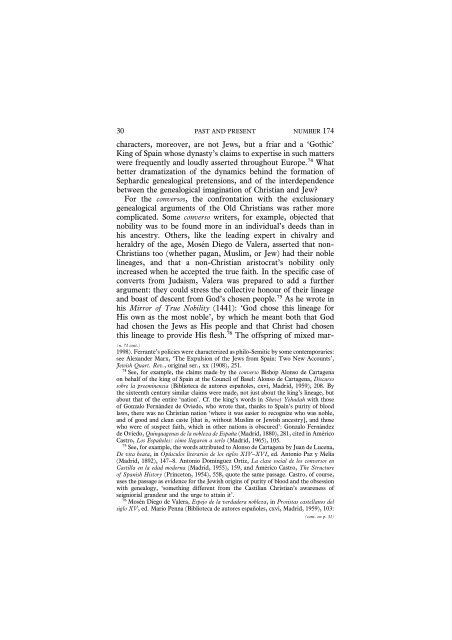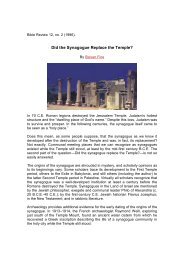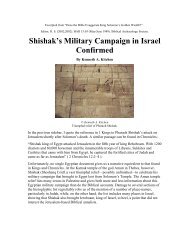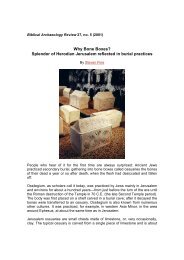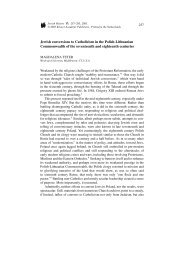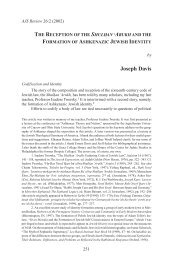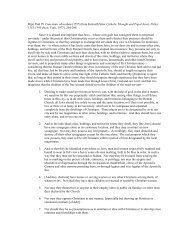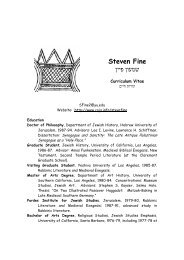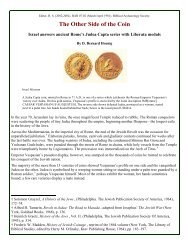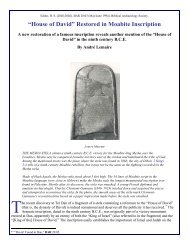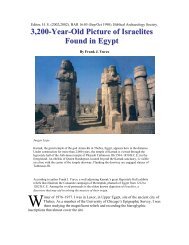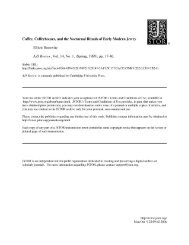jews and christians in fifteenth-century spain
jews and christians in fifteenth-century spain
jews and christians in fifteenth-century spain
Create successful ePaper yourself
Turn your PDF publications into a flip-book with our unique Google optimized e-Paper software.
30 PAST AND PRESENT NUMBER 174<br />
characters, moreover, are not Jews, but a friar <strong>and</strong> a ‘Gothic’<br />
K<strong>in</strong>g of Spa<strong>in</strong> whose dynasty’s claims to expertise <strong>in</strong> such matters<br />
were frequently <strong>and</strong> loudly asserted throughout Europe.74 What<br />
better dramatization of the dynamics beh<strong>in</strong>d the formation of<br />
Sephardic genealogical pretensions, <strong>and</strong> of the <strong>in</strong>terdependence<br />
between the genealogical imag<strong>in</strong>ation of Christian <strong>and</strong> Jew?<br />
For the conversos, the confrontation with the exclusionary<br />
genealogical arguments of the Old Christians was rather more<br />
complicated. Some converso writers, for example, objected that<br />
nobility was to be found more <strong>in</strong> an <strong>in</strong>dividual’s deeds than <strong>in</strong><br />
his ancestry. Others, like the lead<strong>in</strong>g expert <strong>in</strong> chivalry <strong>and</strong><br />
heraldry of the age, Mosén Diego de Valera, asserted that non-<br />
Christians too (whether pagan, Muslim, or Jew) had their noble<br />
l<strong>in</strong>eages, <strong>and</strong> that a non-Christian aristocrat’s nobility only<br />
<strong>in</strong>creased when he accepted the true faith. In the specific case of<br />
converts from Judaism, Valera was prepared to add a further<br />
argument: they could stress the collective honour of their l<strong>in</strong>eage<br />
<strong>and</strong> boast of descent from God’s chosen people.75 As he wrote <strong>in</strong><br />
his Mirror of True Nobility (1441): ‘God chose this l<strong>in</strong>eage for<br />
His own as the most noble’, by which he meant both that God<br />
had chosen the Jews as His people <strong>and</strong> that Christ had chosen<br />
this l<strong>in</strong>eage to provide His flesh.76 The offspr<strong>in</strong>g of mixed mar-<br />
(n. 73 cont.)<br />
1998). Ferrante’s policies were characterized as philo-Semitic by some contemporaries:<br />
see Alex<strong>and</strong>er Marx, ‘The Expulsion of the Jews from Spa<strong>in</strong>: Two New Accounts’,<br />
Jewish Quart. Rev., orig<strong>in</strong>al ser., xx (1908), 251.<br />
74 See, for example, the claims made by the converso Bishop Alonso de Cartagena<br />
on behalf of the k<strong>in</strong>g of Spa<strong>in</strong> at the Council of Basel: Alonso de Cartagena, Discurso<br />
sobre la preem<strong>in</strong>encia (Biblioteca de autores españoles, cxvi, Madrid, 1959), 208. By<br />
the sixteenth <strong>century</strong> similar claims were made, not just about the k<strong>in</strong>g’s l<strong>in</strong>eage, but<br />
about that of the entire ‘nation’. Cf. the k<strong>in</strong>g’s words <strong>in</strong> Shevet1 Yehudah with those<br />
of Gonzalo Fernández de Oviedo, who wrote that, thanks to Spa<strong>in</strong>’s purity of blood<br />
laws, there was no Christian nation ‘where it was easier to recognize who was noble,<br />
<strong>and</strong> of good <strong>and</strong> clean caste [that is, without Muslim or Jewish ancestry], <strong>and</strong> those<br />
who were of suspect faith, which <strong>in</strong> other nations is obscured’: Gonzalo Fernández<br />
de Oviedo, Qu<strong>in</strong>quagenas de la nobleza de España (Madrid, 1880), 281, cited <strong>in</strong> Américo<br />
Castro, Los Españoles: cómo llegaron a serlo (Madrid, 1965), 105.<br />
75 See, for example, the words attributed to Alonso de Cartagena by Juan de Lucena,<br />
De vita beata, <strong>in</strong>Opúsculos literarios de los siglos XIV–XVI, ed. Antonio Paz y Melía<br />
(Madrid, 1892), 147–8. Antonio Domínguez Ortiz, La clase social de los conversos en<br />
Castilla en la edad moderna (Madrid, 1955), 159, <strong>and</strong> Américo Castro, The Structure<br />
of Spanish History (Pr<strong>in</strong>ceton, 1954), 558, quote the same passage. Castro, of course,<br />
uses the passage as evidence for the Jewish orig<strong>in</strong>s of purity of blood <strong>and</strong> the obsession<br />
with genealogy, ‘someth<strong>in</strong>g different from the Castilian Christian’s awareness of<br />
seigniorial gr<strong>and</strong>eur <strong>and</strong> the urge to atta<strong>in</strong> it’.<br />
76 Mosén Diego de Valera, Espejo de la verdadera nobleza, <strong>in</strong>Prosistas castellanos del<br />
siglo XV, ed. Mario Penna (Biblioteca de autores españoles, cxvi, Madrid, 1959), 103:<br />
(cont. on p. 31)


